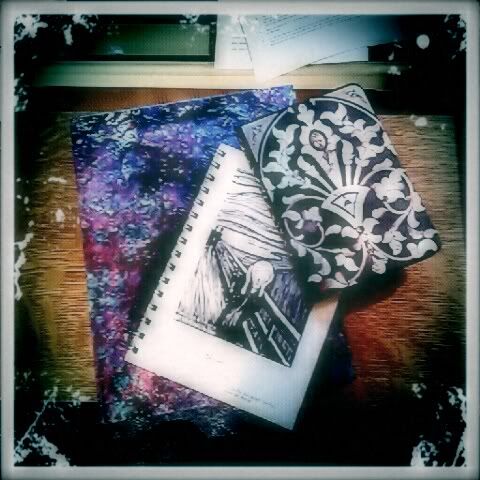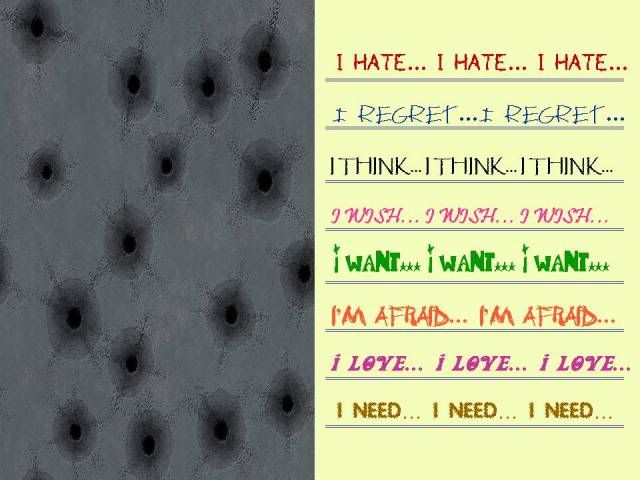 The Healing Power of Your Poetic Soul, Part 4
The Healing Power of Your Poetic Soul, Part 4Focused Journal Writing
by Kristy Johnson
… if we walk in the light, God himself being the light,
we also experience a shared life with one another…
(1 John 1: 7, The Message)
You may already realize the value of journaling, but in this last part of our four part series on your poetic soul, I want to introduce you to a few variations on how to journal. These variations can be prompts for you to determine how YOU want to proceed. Many people use the practice of journaling to: 1) meditate on scripture, 2) as a devotional to cry out to God, or 3) to keep a list of prayers for others, etc. This, of course, is an important practice in the walk of faith. Journaling can be used, as well, to chronicle and manage the difficult emotions, triggers and pain that you face as a survivor of abuse. And it can ALSO be used to help you reconnect with the JOYS of sensation and reclaim the memories of your past that give you PLEASURE rather than pain. It can help you walk in the light.
I recommend you have 2 or 3 different journals to refer to in your recovery process. If you so choose, they can be: 1) Journal of Faith, 2) Journal for Managing Emotions, 3) Journal of Wonder & Joy. Obviously, it may be too time consuming to use each one daily, but they can be on hand for you to use whenever you feel the need to focus on a certain aspect in your life. Choose journals with covers that reflect the content you’ll be writing about. For example, my Journal for Managing Emotions has a picture of a painting by Evard Munich, The Scream, and my Journal of Wonder & Joy is a larger size (9 ½ by 11) with a marbleized cover in pastel blues and pinks so that I have enough room to write and paste pictures in.
In this final installment on the healing power of your poetic voice, I want to focus on how to create a Journal of Wonder & Joy. Often, one of the by-products of the abuse experience is an inability to feel or trust the natural sensations we experience as adults. Our senses may, at times, feel threatening because they trigger painful emotional memories of the past. As a defense mechanism we deal with this unfortunate fact by numbing ourselves to ALL our senses, even those that are healthy natural sensations.
To help reclaim the joy of sensation do the following:
1) Either go to or imagine a place that you feel most safe in. It could be a beach, a park, a room in your house, a beloved friend or family member’s home, backyard etc. Using all of your senses describe everything about this place. What sounds do you hear? What do you see, be specific? What smells or tastes do you experience?
2) After you have a very detailed description, use the declarative statement of I love… to describe how you feel about this place and why it gives you joy, makes you feel safe etc.
3) To take it a step further, use your descriptions to write a story about a pleasant memory you had in this place. Allow yourself to really feel the sensations in your body as you describe. If in the process you start to feel shameful or dirty for feeling these things, remind yourself that this is a safe place and the sensations you are feeling are connected to something that you know is healthy and nurturing to the person you are today.
In a similar fashion, use the same process to document the pleasant memories of your past. The truth is that past memories are not all painful. All of us have had at least one or more moments in our lives that bring a smile to our faces when we remember them. The problem is the abuse, being all consuming at times, hasn’t allowed you to fully enjoy those wonderful memories. Reclaim your pleasant memories by applying the steps described above. Imagine and describe all you see, hear, smell, taste and feel about these memories. If you’re a visual person, you may want to include a collage of pictures and words from magazines to illustrate the descriptions you’ve written.
Hopefully, such focused journaling of your experiences will empower you to walk in light, to cultivate healing words, and to know you have a voice to express both the ugly and beautiful truths of your journey beyond abuse.
I saw the cumulative power of this practice recently. I was in the process of organizing a small closet that held all of my old journals. It was a very enlightening project. Reading these journals both horrified and empowered me. I was horrified by the voice of the person who wrote those words. I couldn’t relate to her, she was so different from who I am today. I had a hard time believing that my hand wrote the words I was reading.
But, then I realized I am a 40-something woman reading the words of a 20-something girl who had not yet started on her journey of healing beyond abuse. This girl was fumbling around in darkness without any sense of who she was, but she was writing-her-way to understanding, trying to figure it all out by chronicling her daily life, crying out to God and meditating on scripture. What empowers the woman I am today is the fact that I am no longer that lost girl. In my hand was a testimony to who I was then, but in my heart and head was the knowledge that I have grown beyond her.
Some of the questions she had, I found answers too. Some of the guilt and shame she suffered, I am able to deal with because of the tools I’ve been given to do so. She was lost in darkness and I walk in light. A light that often shines on some ugly realities but, because I am able to see them clearly through my journals, I have the perception to handle them truthfully. That’s not to say I always do so, but I cannot deny that the lies and truths I’ve discovered so far in my journey are in full view because of the light they now live in.
This is the power of journaling. This is the healing power of written testimony!





